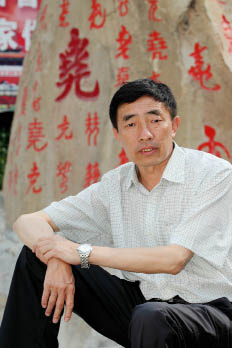Dynamic Changes in a Mountain Village
In Search of Sustainable Development
The mining business enabled Yaozhihe villagers to improve their lives and put aside money for the future. In 1995, their lot was improved further when the government exempted local farmers from agricultural taxes. However, Sun was aware that the village’s mineral resources were finite and they needed a more sustainable industry. He decided that development of hydropower was the answer.
The two rivers running by Yaozhihe Village have a limited flow but their courses drop sharply – ideal for hydropower station construction. But construction of a power station would require huge investment beyond the means of the village.
This time Sun believed that the solution could be found through a joint-stock company. “After making up my mind I sought cooperation with the Qiaoshang Township Hydropower Company in Fangxian County. I chose that company because of its financial and technical strength, particularly its experience in building small hydropower stations. The cooperation was finally settled upon and they agreed to become a shareholder by doing the feasibility study and design in addition to a cash investment of RMB 800,000,” Sun recalled.
Upon returning to the village Sun and several village cadres visited local households to persuade them to invest and make up the remainder of the funds needed. Some villagers were worried about the risk. Sun explained to them over and over again that the mineral resources would be exhausted some day, but that water is a renewable resource, assuring them that investing in such a project would bring far more profits than money deposited in a bank. His efforts finally paid off. All together they raised RMB 500,000 from the villagers and the village committee provided another RMB 2.12 million. In December 1995, their first joint-stock village hydropower station was put into operation.
In January 1996, the CPC Yaozhihe village committee led the villagers in building a second hydropower station on the Mamian River. The dam had to be built in a narrow valley with the cliffs towering on either side. Because there was no road to the construction site, villagers transported over 500 tons of cement and steel bars manually along two kilometers of mountain trail on their back and shoulders. “Everyone made eight round trips and worked at least 12 hours a day to transport the construction materials. But no one expected that a sudden downpour would cause torrents of rain water to rush down the mountain and destroy the dam when it was almost finished. Although I felt as discouraged as everyone else, I still urged my fellow villagers to start over, and we worked together to rebuild the dam,” Sun said.
Sun still remembers the scene. Seniors in their 60s and 70s couldn’t undertake heavy work so they helped boil water for drinking and cook meals. Children helped carry as much sand as they could in their schoolbags. Fueled by their determination to achieve a comfortable life and lay down a good economic groundwork for their descendants, the people of Yaozhihe managed to build in less than a month a 27-meter-high, 80-meter-wide dam capable of storing 280,000 cubic meters of water.
This was followed by a third and then a fourth hydropower station, bringing the total installed capacity up to 3,600 kilowatts. The four stations now generate 30 million kilowatt-hours of electricity value at RMB 6.5 million every year.
 |
| Sun Kailin, secretary of the CPC Yaozhihe Village Committee. |
Modern Enterprise in a Mountainous Area
Despite these successes, the people of Yaozhihe have not rested on their laurels and persist in their pursuit of a better life. They produce mineral products of ever higher added value and with greater efficiency. A 10,000-ton white phosphorus project has been in operation for two years, and a fine phosphate project has just started production and will add to the village’s annual output by more than RMB 1 billion.
To improve technological innovation and develop new products, Yaozhihe Village has also established a cooperative partnership with Hubei University and Pei Rongfu, a member of the Chinese Academy of Engineering. Using the phosphate plant as a platform, they worked together to promote research on the circular economy and a “5R” sustainable development mode of mineral resources, which features reduced investment, the reuse and recycling of resources, and reclamation of old mines into farm fields or woods.
As part of their joint effort, a large business group composed of 22 enterprises whose services cover phosphate mining, hydropower development, tourism, alcoholic beverages and restaurants has been established. Their hard work has contributed to the fast development of the village’s economy and created a miniature economic miracle in a remote, destitute mountainous area.
Visitors to Yaozhihe Village are lavish in their admiration for the achievements they witness here, and Sun Kailin has in particular received much attention and praise. A New Zealand entrepreneur was so moved by the pioneering spirit of Sun Kailin that he wanted to give Sun a Rolls-Royce. A group of teachers and students from Tsinghua University said after a trip to Yaozhihe Village: “If there were a Nobel Prize for agriculture, it should be awarded to Sun Kailin.”
Sun’s dedication and foresight has played a pivotal role in bringing prosperity to the village. But it is also thanks to the efforts of the whole community, who have contributed their savings and toiled for countless hours, that their village and their lives have been transformed. It has been a huge undertaking, the scale of which is evident in the work of the village’s 200-plus laborers. Over the past 20 years they have excavated four billion cubic meters of earth and stone, erected more than 200 kilometers of electricity transmission lines, and built on vertiginous mountain slopes more than 120 kilometers of road including 20 tunnels through the mountains.
GAO TING formerly worked for China Business Update, China Peoples and Hong Kong-based Economic Information and is now a freelance writer.

